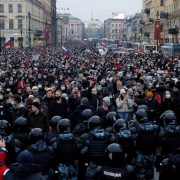
Drums of war sound louder around China. For at least three years, Beijing’s propaganda has been warning that China must prepare for war, a vague phrase in China’s often macho Communist Party rhetoric.
The announcements are to be taken literally, warned a recent Foreign Affairs article signed by two of the most prominent China analysts in the US, John Pomfret and Matt Pottinger.[1] It is because, in the past, Chinese President Xi Jinping has always done what he said, the writers averred. General Mark Milley, US chairman of the Joint Chiefs of Staff, a few days later called for toning down the rhetoric about war with China and instead better preparing for an upcoming conflict with the Asian giant.[2]
“I don’t believe war is inevitable. I don’t think it’s imminent,” Milley remarked. “But I do think that we need to be very, very pragmatic and cautious going forward. And we will reduce the likelihood of war if we remain really, really strong, relative to China, and China knows that we have the will to use it, if necessary.”
Here is a red line. If the US becomes weaker relative to China, the US will also become more nervous. But will China accept remaining much weaker vis-à-vis the US? Evidence points to the contrary. The People’s Liberation Army (PLA) budget is increasing, and its equipment is improving in quality and quantity, as Beijing fears a dominant American military might will limit China’s ambitions. From this, we can see a dangerous vicious circle stepping up very quickly.
If the vicious circle is not checked and stopped, although war is not inevitable or imminent, it is likely and looming. Plus, the experience with the Russian invasion of Ukraine sets an ominous precedent. Then, most observers thought Russian President Vladimir Putin wouldn’t move troops toward Kyiv. He did it. Now, nobody is willing to bet that US-China friction will not devolve into a full-fledged war, especially since there are so many flash points around China: Taiwan, the South China Sea, North Korea, the Senkaku islands, the Indian border.
Here America is in a good position. If China hits the brakes before it’s too late, Washington can claim it has blocked China’s threat. If China moves forward, a conflict around China could help the US crack its domestic divisions and solve its enormous debt and the vast trade deficit with Beijing.
Before World War II, America was bitterly split. It had an enormous Nazi party led by a national hero, aviator Charles Lindbergh, and it was mired in debt caused by the 1929 financial crisis. The war canceled both in a few years.
Now, a war with China could do the same. It doesn’t mean that America wants a war. A veteran of many wars, America knows that conflicts are hard to predict. One knows how and when they start. It is much harder to see when and how they’ll end. But a limited war with China might not be a total disaster for the US.
For China, it would be very different. Tensions are already taking a toll on the national economy. A war could have unfathomable consequences. In the best-case scenario, Beijing could follow Pyongyang’s fate and become a vast hermit country. At worst, it could burst into civil war.
Is China considering all the risks and weighing all possibilities attentively? Is it then choosing consciously what way to go, or is it just stumbling along like a blind man in a cluttered room?
Leaders of the past went to war taking conscious gambles, knowing the risks ahead. Is China fully aware of its future path?
Blindman or Warmonger?
In the past 20-plus years, China progressively strayed because of long-term neglect (believing the US was declining) and short-term mistakes (ideologizing Covid policies and trusting Russia to win in Ukraine).[3] The errors were possible due to general long-term neglect.
Every country makes mistakes and blunders, yet each does so in its own unique way.
Things went so far that people forgot how it started, and for almost two decades, voices of American decline were so solid and unfettered that they muted every other sound, and China was living in an echo chamber.
China’s one-party rule certainly didn’t help foster different opinions and critical ideas about developments. Still, maybe something deeper was also playing a role, which should be addressed.
Western thinkers came from a priestly tradition; they dealt with gods. Chinese thinkers were trained as bureaucrats, managing up (higher officials or the emperor) and down (lower officials or ordinary people).[4]
The Greek basic tenet was the search for truth, which is absolute and independent of any other condition. China’s basic tenet was the Tao/Way, which meant finding a way to solve issues, mostly of human nature, between rulers, nature, and people.
When the Way was not followed, and conflicts erupted between rulers and people, the Way had to be recovered. The official or intellectual tried to do so by mediating or, when mediation was impossible, by siding with the people or the ruler. Tao, being relational, needs to be grounded here or there, ideally in both.
Conflicts are rare and dramatic when they burst forth, leading to the elimination of the opponent guilty of a capital crime: breaking the Way. It leads to the extermination of the loser. In Chinese history, past dynasties were wiped out.
Conflicts about truth are constant and not necessarily too dramatic, especially in modern times. The aristocrats of past kingdoms survived. When clashes erupt, they are about principles that in modern times can be solved leaving principles on a side and carrying on with normal life. In modern times they have been often about wealth distribution or wealth acquisition, and trying to balance it out because the system doesn’t work otherwise.
Without enough distribution, there is disruptive social conflict and no consumption, and then the economy dies; without enough reward for the rich, there is no investment and thus no innovation, and everything fails.
Being constant, conflicts do not necessarily imply the total elimination of the enemy.
The Way of modern China has been about maintaining the power of the present dynasty and the well-being of the people. Is it being broken? It is open to dispute.
However, the central point is that truth is not relational; it can go against both the king and the people, and open a totally new world. It is independent of them.
It led to a centuries-old debate about how to verify and prove the truth. It has now found a consensus to a complex search for empirical elements, cutting ties with religious truths based on sacred books. These empirical elements can prove and refute the scientific truth, which is temporary, although the method is believed to be transcendent and permanent. Thus, in a time of empirical truths, you want the survival of different truths to challenge your present position and be alert of possible changes.
The leap of faith out of religion into the territory of modern science took place when Europe was “invaded” by Chinese concepts brought in by Jesuit missionaries.[5] The Catholic Church helped bring about modernity, and so did China. It doesn’t mean that China or the Church are all “included” in modernity, but they are no strangers to that.
It leads to touchy points. As Chinese intellectuals and officials deal with the relational Way, they tend first to consider how their superiors will take the report they deliver, even without considering the constraints of the one-party rule. In fact, within the party, officials in theory can voice any opinion, but they are rewarded if their leader likes what he hears. Then the whole effort is not about telling “the truth,” what one really thinks, but about pleasing by second-guessing its leader.
Politics and Culture
Furthermore, the Way tradition and its alignment open further questions. What is China’s Way of aligning itself with the world? And what does China consider the world to be? The 5.5 billion of the global south, or the 1 billion of the global north (the G7, expanded)? The buyers of China’s surplus—those that provide the resources to buy energy and food—are all in the global north.
The sellers of food and energy can’t be left behind, but the buyers are the main clients. Then to wage war against one’s primary source of income seems absurd, especially in China, where kids are taught to call the one who gives you milk “mom” (有奶就叫娘). The world has no perfect shape.
The path to war for China then seems a monumental screwup coming from a short circuit of a system plus a tradition, not a calculated gamble. But then the problem is how to step back because it is not the simple decision of a man but a deep historical and political drift that was neglected for decades. Many things have been piling up on each other, which are difficult to unravel.
Politics and culture are a problem here. In the 1987 congress, a few years after the crackdown on the democracy wall protests in Xidan, Beijing, the party decided to move to divide politics and enterprise. It was meant to be the first step of political reforms. In 1989, after the crackdown on the students’ movement, party honcho and security czar Qiao Shi was rumored to have campaigned to push forward political and economic reforms.
Putting down the protests was supposed to be instrumental in implementing reforms (economic and political) at the party’s tempo, not under students’ pressure and not forgetting about political reforms. Qiao pushed for greater powers in the National People’s Congress until he stepped down at the 1997 party congress.
Still, 25 years later, brushing up on political reforms is not easy. Many international issues compound the party’s domestic problems, and a way out of the maze seems more difficult.
[1] https://www.foreignaffairs.com/united-states/xi-jinping-says-he-preparing-china-war
[2] https://www.defenseone.com/threats/2023/03/lower-rhetoric-china-says-milley/384693/
[3] See http://www.settimananews.it/informazione-internazionale/chinese-balloons-and-us-alchemic-leadership/ and http://www.settimananews.it/informazione-internazionale/chinese-trust-drain/
[4] I owe the points to a conversation with David Yang.
[5] See also http://www.settimananews.it/informazione-internazionale/china-vision-of-the-us-crisis/






You’re just a liar.
“Here, America is in a good position. If China hits the brakes before it’s too late, Washington can claim it has blocked China’s threat. If China moves forward, a conflict around China could help the US crack its domestic divisions and solve its enormous debt and the vast trade deficit with Beijing.”
You’re insane. If you think the US globalists forcing its population into a war with China is going to work, you’re a deluded piece of elite trash who simply feeds off one lie after another.
“Before World War II, America was bitterly split. It had an enormous Nazi party led by a national hero, aviator Charles Lindbergh, and it was mired in debt caused by the 1929 financial crisis. The war canceled both in a few years.”
That is complete and total nonsense, propaganda, Globalist revisionist lies.
If you want peace prepare for war, and that is what China is doing.
The US economy is based on the ability to buy more than it produces by creating huge amounts of dollars out of thin air, made possible after the demise of hard currency in 1971 by the “petrodollar” concept which is based on the perpetual friendship with Saudi Arabia. We now see that Kingdom as a friend of China and Russia and a candidate member of BRICS+ together with Iran, Mexico and Argentina and many other countries.
We see that the huge Ukrainian army set up after 2014 to exhaust and destroy Russia is being exhausted by a war more intense than US and NATO experts could imagine. Some people in US claim that the Pentagon budget should be doubled even while it is already as large as that of the seven next biggest military spenders together. US has trouble developing hypersonic weapons and new ICBMs because of a lack of engineers. Russia already employs two types of hypersonic weapons and China is close to doing so but there is a rumor that it might buy Russian ones in addition.
These factors show that the times they are achanging. They suggest that the time for US aggression against Russia and/or China has already passed but it is prudent for China, and Russia, to continue preparing for it.